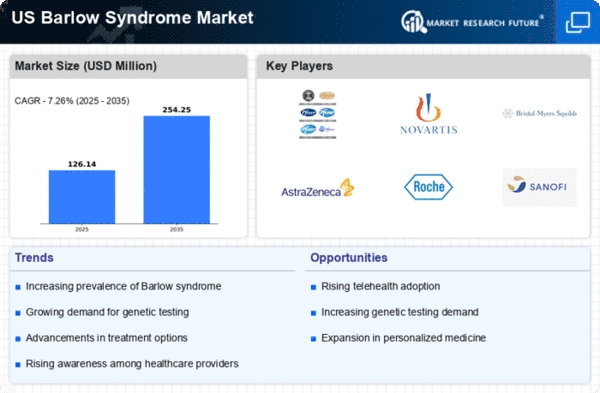Increased Focus on Patient-Centric Care
The shift towards patient-centric care is a significant driver for the barlow syndrome market. Healthcare providers are increasingly prioritizing the needs and preferences of patients, leading to more personalized treatment approaches. This trend is particularly relevant for conditions like Barlow syndrome, where individual patient responses to therapies can vary widely. The emphasis on patient engagement and shared decision-making is likely to enhance treatment adherence and satisfaction, ultimately improving health outcomes. As healthcare systems adapt to this model, the barlow syndrome market may see a rise in demand for tailored therapies and support services. Additionally, patient advocacy groups are playing a vital role in raising awareness and promoting research, further influencing the market dynamics.
Increasing Prevalence of Barlow Syndrome
The rising incidence of Barlow syndrome in the US is a crucial driver for the barlow syndrome market. Recent estimates suggest that approximately 1 in 1,000 individuals may be affected by this condition, leading to a growing patient population requiring specialized care. This increase in prevalence necessitates enhanced diagnostic and therapeutic options, thereby stimulating market growth. Healthcare providers are increasingly focusing on early detection and management strategies, which further propels the demand for innovative treatments. As awareness of the syndrome expands, more patients are likely to seek medical attention, contributing to the overall growth of the barlow syndrome market. The increasing prevalence also encourages pharmaceutical companies to invest in research and development, aiming to create effective therapies tailored to this specific patient demographic.
Growing Investment in Rare Disease Research
The market is experiencing growth due to increased investment in research focused on rare diseases. Government and private sector funding for rare disease research has seen a notable rise, with the National Institutes of Health (NIH) allocating substantial resources to study conditions like Barlow syndrome. This financial support is crucial for developing new therapies and improving existing treatment options. In 2025, funding for rare disease research is expected to exceed $1 billion, reflecting a commitment to addressing unmet medical needs. As research progresses, The market is likely to benefit from the introduction of novel therapies and improved patient outcomes. The emphasis on rare diseases also encourages collaboration among researchers, healthcare providers, and pharmaceutical companies, further enhancing the market landscape.
Regulatory Support for Innovative Therapies
Regulatory bodies in the US are increasingly supportive of innovative therapies for rare conditions, including Barlow syndrome. The Food and Drug Administration (FDA) has implemented various initiatives to expedite the approval process for treatments targeting rare diseases. This regulatory environment encourages pharmaceutical companies to invest in the development of new therapies, as the pathway to market entry becomes more streamlined. In 2025, it is anticipated that the number of orphan drug designations will continue to rise, facilitating the growth of the barlow syndrome market. The potential for expedited approvals and market exclusivity incentivizes research and development efforts, ultimately benefiting patients with Barlow syndrome. As more innovative therapies become available, the market is likely to expand, providing new options for patients and healthcare providers.
Technological Advancements in Diagnostic Tools
Technological innovations in diagnostic tools are significantly impacting the barlow syndrome market. The introduction of advanced imaging techniques, such as high-resolution echocardiography and cardiac MRI, has improved the accuracy of diagnosing Barlow syndrome. These advancements enable healthcare professionals to identify the condition at earlier stages, which is essential for effective management. The market for diagnostic equipment is projected to grow, with estimates indicating a compound annual growth rate (CAGR) of around 7% over the next five years. As diagnostic capabilities improve, the barlow syndrome market is likely to expand, driven by the need for timely and precise interventions. Furthermore, the integration of artificial intelligence in diagnostic processes may enhance the efficiency and effectiveness of identifying Barlow syndrome, thereby fostering market growth.
















